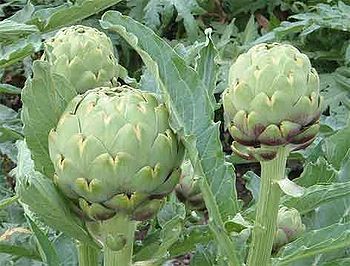Difference between revisions of "Artichoke"
| Line 1: | Line 1: | ||
| − | |||
[[File:Globe-Artichoke-benefits.jpg|thumb|350px|left|Artichoke]] | [[File:Globe-Artichoke-benefits.jpg|thumb|350px|left|Artichoke]] | ||
| + | Other Names: Alcachofa, Alcaucil, ALE, Artichaut, Artichaut Commun, Artichaut Sauvage, Artichoke Extract, Artichoke Fruit, Artichoke Leaf, Artichoke Leaf Extract, Artischocke, Cardo, Cardo de Comer, Cardon d'Espagne, Cardoon, Cynara, Cynara cardunculus, Cynara scolymus, Extrait d’Artichaut, Feuille d’Artichaut, Garden Artichoke, Gemuseartischocke, Globe Artichoke, Kardone, Tyosen-Azami.<br> | ||
==Special Precautions of Artichoke== | ==Special Precautions of Artichoke== | ||
* Artichoke is safe in the amounts used in foods. It is POSSIBLY SAFE when used as a medicine. It has been used safely in research for up to 23 months. | * Artichoke is safe in the amounts used in foods. It is POSSIBLY SAFE when used as a medicine. It has been used safely in research for up to 23 months. | ||
Revision as of 04:01, 4 May 2014
Other Names: Alcachofa, Alcaucil, ALE, Artichaut, Artichaut Commun, Artichaut Sauvage, Artichoke Extract, Artichoke Fruit, Artichoke Leaf, Artichoke Leaf Extract, Artischocke, Cardo, Cardo de Comer, Cardon d'Espagne, Cardoon, Cynara, Cynara cardunculus, Cynara scolymus, Extrait d’Artichaut, Feuille d’Artichaut, Garden Artichoke, Gemuseartischocke, Globe Artichoke, Kardone, Tyosen-Azami.
Special Precautions of Artichoke
- Artichoke is safe in the amounts used in foods. It is POSSIBLY SAFE when used as a medicine. It has been used safely in research for up to 23 months.
- In some people, artichoke can cause some side effects such as intestinal gas and allergic reactions. People at the greatest risk of allergic reactions are those who are allergic to plants such as marigolds, daisies, and other similar herbs.
- Pregnancy and breast-feeding: Not enough is known about the use of artichoke during pregnancy and breast-feeding. Stay on the safe side and avoid use.
- Bile duct obstruction: There is concern that artichoke might worsen bile duct obstruction by increasing bile flow. If you have this condition, don’t use artichoke without first discussing your decision with your healthcare provider.
- Allergy to ragweed and related plants: Artichoke may cause an allergic reaction in people who are sensitive to the Asteraceae/Compositae family. Members of this family include ragweed, chrysanthemums, marigolds, daisies, and many others. If you have allergies, be sure to check with your healthcare provider before taking artichoke.
- Gallstones: Artichoke might make gallstones worse by increasing bile flow; use artichoke with caution.
The benefits of Artichoke are
Artichoke has chemicals that can reduce nausea and vomiting, spasms, and intestinal gas. These chemicals have also been shown to lower cholesterol.While many people's favorite part is the heart, it is the leaves that contain many of the artichoke's powerful health benefits. It contains a phytonutrient called cynarin that helps offer relief by stimulating the production of bile.
- Upset stomach symptoms such as nausea, vomiting, gas, and stomach pain, when artichoke leaf extract is used. Improvement can take up to 2 to 8 weeks of treatment.
- High cholesterol. Taking a specific artichoke extract (Valverde Artischocke, Novartis Consumer Health) seems to modestly reduce total and low-density lipoprotein (LDL) cholesterol, and the LDL/high density lipoprotein (HDL) ratio over 6 to 12 weeks of treatment.
- High in Antioxidants :A study done by the USDA found that artichokes have more antioxidants than any other vegetable and they ranked seventh in a study of the antioxidant levels of 1,000 different foods. Some of the powerful antioxidants in artichokes are quercertin, rutin, anthocyanins, cynarin, luteolin, and silymarin.
- Irritable bowel syndrome (IBS). Developing evidence suggests that artichoke extract might reduce symptoms of IBS. In one study, a specific artichoke leaf extract (Hepar-SL forte, Serturner Arzneimittel GmbH) reduced abdominal pain and cramping, bloating, gas, and constipation associated with IBS after 6 weeks of treatment. In another study, a different specific artichoke leaf extract (Cynara SL, Lichtwer Pharma) reduced the occurrence of IBS symptoms in patients with heartburn by about 26%. People taking this extract also reported improvement in their quality of life after 2 months of treatment.
- Cancer Prevention and Treatment : Studies done with artichoke leaf extract have found that they induce apoptosis (cell death) and reduce cell proliferation in many different forms of cancer, including prostate cancer, leukemia, and breast cancer. An Italian study found that a diet rich in the flavanoids present in artichokes reduces the risk of breast cancer.
- Increased Bile Flow : The pulp of artichoke leaves contains a polyphenol antioxidant called cynarin which increases bile flow.
- Good for the Liver Thanks to cynarin and another antioxidant, silymarin, artichokes are very beneficial to the liver. Studies have found they may even regenerate liver tissue. Artichokes have long been used in folk and alternative medicine as a treatment for liver ailments and the scientific studies are now proving them to be correct.
- Better Digestion : Artichokes help the digestive system. They are a natural diuretic, they aid digestion, improve gallbladder function and, as mentioned above, they are of great benefit to the liver.
- Hangover Treatment : Thanks to their positive effects on the liver, many people swear by artichokes as a hangover treatment. Instead of the hair of the dog, try the leaves of an artichoke.
- Cholesterol Reduction : Ingredients in artichoke leaves have been shown to reduce cholesterol by inhibiting HMG-CoA reductase. They raise good cholesterol (HDL) and lower bad cholesterol (LDL).
- High in Fiber : One large artichoke contains a quarter of the recommended daily intake of fiber. A medium artichoke has more fiber than a cup of prunes.
